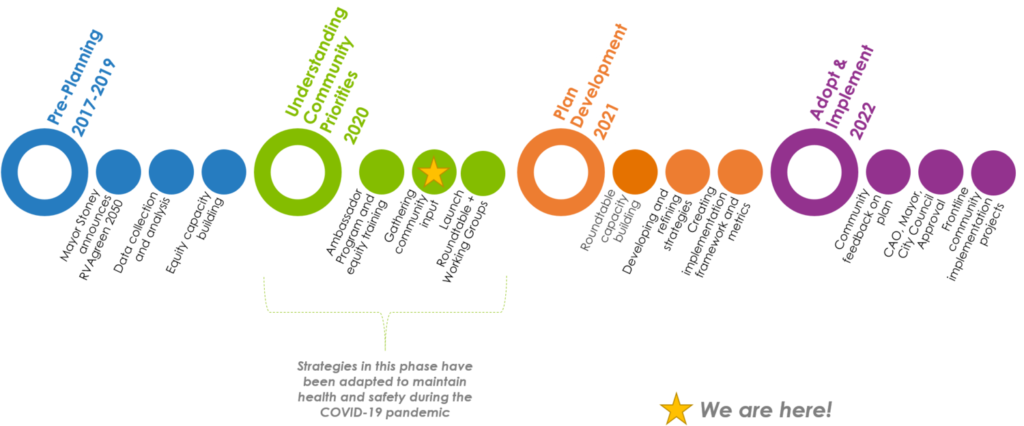Last year, I joined the RVAgreen 2050 Racial Equity Roundtable. It has been an honor to be able to have my voice heard in this conversation and an even bigger honor to listen to my fellow Richmonders express their concerns, frustrations, fears and most importantly love for their community. It has been educational, humbling, and yet empowering to participate in the planning process to help protect and defend the vulnerable communities in Richmond. If you’ve not yet heard
RVAgreen 2050 is the City of Richmond’s equity-centered climate action and resilience planning initiative to achieve net zero greenhouse gas emissions by 2050 and help the community adapt to Richmond’s climate impacts of extreme heat, precipitation, and flooding. This community-wide initiative to develop and implement a roadmap of actions is using an innovative planning approach that centers frontline community members and works at the intersection of equity, mitigation, and climate resilience. RVAgreen 2050 is equitable climate action for a healthy and resilient Richmond.
What is RVAgreen 2050?
This effort was planned before the COVID-19 pandemic, which means we’ve had to navigate some less-than-ideal circumstances in doing our work. In fact, I wasn’t entirely sure of how we’d be pulling off community engagement in the time of COVID but nevertheless, it is coming together!

As part of this planning process, the City of Richmond has also established a roundtable of community stakeholders who meet 2-4 times monthly to discuss the priorities of the community and procedures to support those priorities with respect to the disparity that Black and Brown people are far more likely to experience as a result of climate change, especially in Richmond. The Office of Sustainability has worked directly with the roundtable and working groups to supply us with data and information about many topics around climate change and how those impacts are being felt in the Greater Richmond Metro.
Climate change affects some members of our community more than others. Individuals in poverty have fewer resources and receive less support, which reduces their ability to prevent, cope with, and adapt to climate change impacts. Climate change impacts increase the vulnerability of individuals below the poverty level, causing a rise in risks such as physical and mental illnesses, job loss, and decreased food security.
In addition, due to historic and institutional racism, people of color are more likely to live in more marginal and exposed areas that are more susceptible to climate impacts. For these reasons, it is critical that the City of Richmond’s efforts to address climate change are carried out in a way that is inclusive of and protects our most vulnerable communities.
Climate Equity | Rvagreen 2050
I moved to the metro in 2012 and within city limits in 2016. Living in Highland Park was the first time I ever really felt at home in a place. It was unreal how fast I saw the gentrification change the neighborhood. My loved ones had to start moving out sooner than I did. Ultimately, I lost my affordable rental home because the owners were ready to sell and I wasn’t ready to buy. The $67,000 property I lived in for three years was sold to flippers for $160k and to the current owner for somewhere over $250k.
It took me a few months to get back on my feet after my home was sold. I ended up spending hundreds more each month to live in a poorly renovated apartment on Chamberlayne for the next 18 months. I recently moved to one of the amazing lofts in Manchester and finally feel like my housing is safe and beautiful. But it certainly isn’t affordable.
What does affordable housing have to do with climate change? Well, a lot. Although corporations are the biggest source of carbon emissions, green housing is an important part of creating sustainable communities. Simply weatherizing homes for better energy efficiency comes with costs to the homeowners that are often transferred to renters by way of increased rent. What they might save on their energy bill doesn’t necessarily offset the increased cost to rent. If we fail to properly weatherize and supply adequate heating and cooling, we see negative and sometimes lethal health impacts. With temperatures steadily rising, heat-related illnesses and deaths rise too. And who do you think suffers the brunt of that impact? Black and Brown people in low-income communities.
Honestly, I could talk for days about the subject but I won’t. At least not right now. There are very clear intersections between racial equity and environmental sustainability and I respect that the City of Richmond is attempting to play a proactive role in mitigating those impacts through the process.
If you’re a Richmonder, I encourage you to learn more about this initiative and participate in the community surveys that are often released. I’ll be sharing more about what we’re doing, if we have opportunities for your feedback, engagement or support. For now, I’ll leave you with this letter from the Office of Mayor Levar Stoney.
If you’d like to discuss RVAgreen 2050, green initiatives your company is involved in or really anything else, please don’t hesitate to get in touch. I’m available via FaceTime, Zoom and email and would love nothing more than to have a real conversation with you from the safe distance of our computers.
